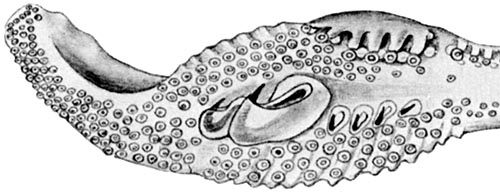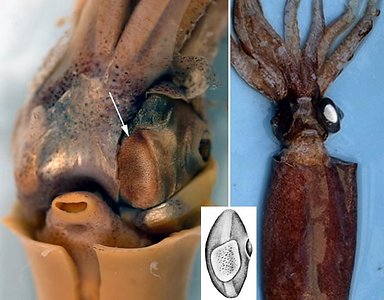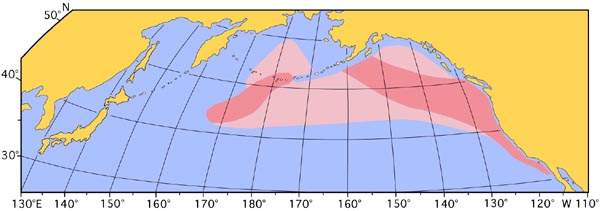Gonatus pyros
Tsunemi Kubodera, F. G. Hochberg, and Richard E. YoungIntroduction
Gonatus pyros is a small gonatid. A spent female measured 125 mm ML (SBMNH no. 61050). Nesis (1982/87) states that some individuals are known to be up to 160 mm ML. G. pyros is distinctive in being the only gonatid known to possess photophores.
Diagnosis
A Gonatus with ...
- a large photophore on the ventral surface of each eyeball.
Characteristics
- Arms
- Total of 29-33 hooks and suckers present on proximal half of each arm I-III; squid >34 mm GL with 36-41 suckers on proximal half of each arm IV.
- Tentacles
- Clubs 20-25% of GL.
- Club dactylus with 7-8 irregular series at proximal end, decreasing to 4 series in mid-dactylus.
- Club ventral-marginal zone with 3, sometimes 4, series of suckers in central region all nearly same size.
- Club dorsal-marginal zone with 3 irregular series dorsal to large central hook.
- Club medial zone with large central hook; distal hook present, occasionally joined by an enlarged sucker with a large tooth; proximal series with usually 3-4 small hooks, occasionally preceeded by a series of suckers. Proximal hooks decrease in size toward club base
- Total number of suckers (excluding terminal pad and medial zone) on tentacular club: about 151-184.
- Median region of tentacular stalk between marginal series with a single, occasionally double and slightly irregular series of sucker adjacent to the ventral-marginal series of the stalk. Lenth variable but usually reaches 3/4 of marginal series length. Medial suckers number between 50-125.
 Click on an image to view larger version & data in a new window
Click on an image to view larger version & data in a new window


Figure. Oral view of the tentacle of G. pyros. Top - Distal region of tentacle, 35? mm GL. Middle - Enlargement of club from top figure. Drawings from Young (1972). Bottom - Distal region of tentacle, 55 mm ML, preserved. Photograph by R. Young.
- Head
- Beaks. Descriptions can be found here: Lower beak; upper beak. See this site also.
- Photophores
- Large, somewhat oval photophore present on ventral surface of each eye.
 Click on an image to view larger version & data in a new window
Click on an image to view larger version & data in a new window
Figure. Ventral view of the head and eyes of G. pyros showing ocular photophore. Left - Eyelid folded back to reveal photophore, preserved, 55 mm ML, immature female. Insert - Drawing of eye and photophore from Young (1972). Right - Fresh squid with the left eye protruding showing the white ocular photophore. Photograph by T. Kubodera. Note the peculiar surface of the photophore which seems to have many small pores.
Comments
More details of the description of G. pyros can be found here.
Life History
The size of the juvenile at which the various hooks first develop is often distinctive of the species.Distribution
Type locality: 33°37'N, 118°26'W, eastern North Pacific off Southern California. G. pyros is broadly distributed in the central and eastern North Pacific.
References
Okutani, T., T. Kubodera and K. Jefferts. 1983. Diversity, distribution and ecology of gonatid squids in the subarctic Pacific: A review. Bull. Ocean Res. Inst., Univ. Tokyo, No. 26 (1):150-192.
Young, R. E. 1972. The systematics and areal distribution of pelagic cephalopods from the seas off Southern California. Smithson. Contr. Zool., 97: 1-159.
Title Illustrations

| Scientific Name | Gonatus pyros |
|---|---|
| Reference | Young, R. E. 1972. The systematics and areal distribution of pelagic cephalopods from the seas off Southern California. Smithson. Contr. Zool., 97: 1-159. |
| View | Ventral |
| Size | 39 mm GL |
| Image Use |
 This media file is licensed under the Creative Commons Attribution-NonCommercial License - Version 3.0. This media file is licensed under the Creative Commons Attribution-NonCommercial License - Version 3.0.
|
| Copyright |
©

|
About This Page

National Science Museum, Tokyo, Japan
F. G. Hochberg

Santa Barbara Museum of Natural History, Santa Barbara, California, USA

University of Hawaii, Honolulu, HI, USA
Page copyright © 2016 , F. G. Hochberg, and
 Page: Tree of Life
Gonatus pyros .
Authored by
Tsunemi Kubodera, F. G. Hochberg, and Richard E. Young.
The TEXT of this page is licensed under the
Creative Commons Attribution-NonCommercial License - Version 3.0. Note that images and other media
featured on this page are each governed by their own license, and they may or may not be available
for reuse. Click on an image or a media link to access the media data window, which provides the
relevant licensing information. For the general terms and conditions of ToL material reuse and
redistribution, please see the Tree of Life Copyright
Policies.
Page: Tree of Life
Gonatus pyros .
Authored by
Tsunemi Kubodera, F. G. Hochberg, and Richard E. Young.
The TEXT of this page is licensed under the
Creative Commons Attribution-NonCommercial License - Version 3.0. Note that images and other media
featured on this page are each governed by their own license, and they may or may not be available
for reuse. Click on an image or a media link to access the media data window, which provides the
relevant licensing information. For the general terms and conditions of ToL material reuse and
redistribution, please see the Tree of Life Copyright
Policies.
- First online 31 May 2006
- Content changed 11 October 2015
Citing this page:
Kubodera, Tsunemi, F. G. Hochberg, and Richard E. Young. 2015. Gonatus pyros . Version 11 October 2015. http://tolweb.org/Gonatus_pyros/19774/2015.10.11 in The Tree of Life Web Project, http://tolweb.org/











 Go to quick links
Go to quick search
Go to navigation for this section of the ToL site
Go to detailed links for the ToL site
Go to quick links
Go to quick search
Go to navigation for this section of the ToL site
Go to detailed links for the ToL site